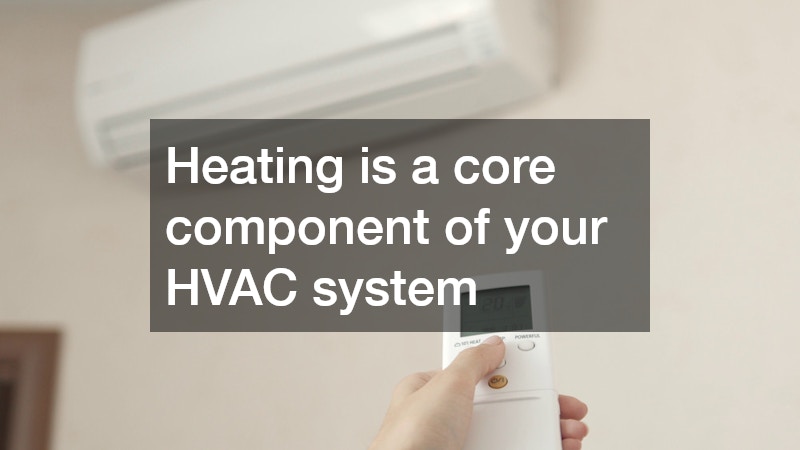
Your HVAC (Heating, Ventilation, and Air Conditioning) system is essential for maintaining the comfort of your home throughout the year. Understanding how this complex system works can help you manage its operation more effectively and ensure it runs efficiently for as long as possible. Let’s delve into the inner workings of your HVAC system to demystify its vital role in your daily life.
The Role of Heating in HVAC Systems
Heating is a core component of your HVAC system, crucial for keeping your home warm during colder months. Most residential HVAC systems use either a furnace or a heat pump to provide heating.
Furnaces burn fuel, such as natural gas, propane, or oil, to generate heat that warms the air. This warm air is then distributed throughout the home via a network of ducts. Heat pumps, on the other hand, transfer heat from the outside air or ground into the home, making them highly efficient in moderate climates.
Regular maintenance by a professional, preferably a local AC company, is essential to keep the heating element of your HVAC system running smoothly. Over time, components such as filters and burners can become dirty, leading to reduced efficiency and potential breakdowns. It’s important to schedule annual inspections and cleanings for your furnace or heat pump to prevent these issues. By doing so, you can ensure that your HVAC system provides consistent and reliable heating throughout the colder months.
In addition to regular maintenance, upgrading to a programmable thermostat can enhance your HVAC system’s heating efficiency. These devices allow you to set specific temperature schedules, ensuring that your heating system only operates when needed. This not only helps reduce energy consumption but also extends the lifespan of your HVAC system. Understanding these aspects of your heating system can lead to more informed decisions and a more comfortable home environment.
The Function of Ventilation in HVAC Systems
Ventilation is a critical part of maintaining healthy indoor air quality, which is often overlooked in HVAC systems. It involves the exchange of indoor air with outdoor air, reducing indoor air pollutants and ensuring fresh air circulates throughout the home. Without proper ventilation, pollutants can accumulate and lead to various health issues, including allergies and respiratory problems. A well-designed HVAC system includes mechanical ventilation, which can be as simple as exhaust fans in kitchens and bathrooms or more complex systems involving ductwork and air exchanges.
Good ventilation also plays a significant role in controlling humidity levels within the home. High humidity can promote mold growth, while low humidity can cause discomfort and respiratory issues. Your HVAC system’s ventilation component helps maintain optimal humidity levels by exchanging indoor air and regulating moisture. Regular checks by a professional, such as a local AC company, can ensure that your ventilation systems operate correctly and efficiently, minimizing potential health risks.
To enhance ventilation, consider integrating technology such as air purifiers or advanced air filtration systems. These devices work in tandem with your HVAC system, capturing airborne particles like pollen, dust, and bacteria, improving overall air quality. While implementing these additional technologies, it’s crucial to maintain your ventilation system regularly to ensure it’s free from obstructions and contaminants. By doing so, you can enjoy cleaner, healthier air within your home.
The Cooling Aspect of HVAC Systems
The air conditioning portion of your HVAC system is responsible for cooling your home during hot weather, ensuring a comfortable indoor environment. Air conditioners work by removing heat from the indoor air, utilizing refrigerant to absorb and expel heat outside. The warm air inside your home is pulled into the ducts and passed over evaporator coils, which cools it down before distributing it back into the living spaces. Central air conditioning systems typically consist of an outdoor unit containing the compressor and an indoor unit housing the evaporator coils.
Efficiency is key when it comes to the cooling capacity of your HVAC system. Advances in technology have led to the development of energy-efficient models that can significantly reduce electricity usage. However, to benefit from these advancements, it’s essential to ensure that your air conditioning system is properly maintained by professionals, such as a local AC company. This includes routine checks, cleaning of coils, and timely replacement of filters.
Another important consideration is the sizing of your air conditioning unit. An improperly sized unit can lead to excessive energy consumption and inadequate cooling. It’s advisable to consult with an HVAC expert to determine the correct size and type of air conditioner for your home. By doing so, you can optimize comfort and efficiency, ensuring that your HVAC system serves you well for many years.




